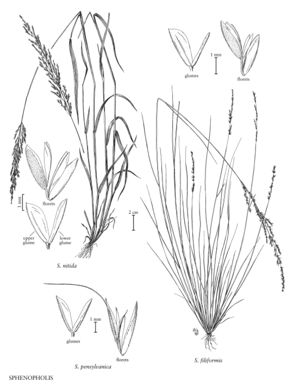Difference between revisions of "Sphenopholis pensylvanica"
FNA>Volume Importer |
imported>Volume Importer |
||
| (7 intermediate revisions by 2 users not shown) | |||
| Line 4: | Line 4: | ||
|publications= | |publications= | ||
|common_names=Swamp oats | |common_names=Swamp oats | ||
| + | |special_status={{Treatment/ID/Special_status | ||
| + | |code=E | ||
| + | |label=Endemic | ||
| + | }} | ||
|basionyms= | |basionyms= | ||
|synonyms={{Treatment/ID/Synonym | |synonyms={{Treatment/ID/Synonym | ||
|name=Trisetum pensylvanicum | |name=Trisetum pensylvanicum | ||
|authority=(L.) P. Beauv. | |authority=(L.) P. Beauv. | ||
| + | |rank=species | ||
}} | }} | ||
|hierarchy=Poaceae;Poaceae subfam. Pooideae;Poaceae tribe Poeae;Sphenopholis;Sphenopholis pensylvanica | |hierarchy=Poaceae;Poaceae subfam. Pooideae;Poaceae tribe Poeae;Sphenopholis;Sphenopholis pensylvanica | ||
| Line 29: | Line 34: | ||
-->{{#Taxon: | -->{{#Taxon: | ||
name=Sphenopholis pensylvanica | name=Sphenopholis pensylvanica | ||
| − | |||
|authority=(L.) Hitchc. | |authority=(L.) Hitchc. | ||
|rank=species | |rank=species | ||
| Line 36: | Line 40: | ||
|basionyms= | |basionyms= | ||
|family=Poaceae | |family=Poaceae | ||
| + | |illustrator=Linda Ann Vorobik;Hana Pazdírková | ||
| + | |illustration copyright=Utah State University | ||
|distribution=Del.;W.Va.;Fla.;N.J.;Conn.;Mass.;R.I.;La.;Tenn.;N.C.;S.C.;Pa.;N.Y.;Va.;Ala.;Ga.;Md.;Ohio;Mo.;Miss.;Ky. | |distribution=Del.;W.Va.;Fla.;N.J.;Conn.;Mass.;R.I.;La.;Tenn.;N.C.;S.C.;Pa.;N.Y.;Va.;Ala.;Ga.;Md.;Ohio;Mo.;Miss.;Ky. | ||
|reference=None | |reference=None | ||
|publication title= | |publication title= | ||
|publication year= | |publication year= | ||
| − | |special status= | + | |special status=Endemic |
| − | |source xml=https:// | + | |source xml=https://bitbucket.org/aafc-mbb/fna-data-curation/src/200273ad09963decb8fc72550212de541d86569d/coarse_grained_fna_xml/V24/V24_885.xml |
|subfamily=Poaceae subfam. Pooideae | |subfamily=Poaceae subfam. Pooideae | ||
|tribe=Poaceae tribe Poeae | |tribe=Poaceae tribe Poeae | ||
Latest revision as of 16:25, 11 May 2021
Culms 30-120 cm, glabrous. Sheaths glabrous or pubescent; ligules 0.2-1 mm; blades 4-10(20) cm long, (1)2-8 mm wide, flat to slightly involute, smooth or scabridulous, sometimes pubescent. Panicles 7-35 cm long, 2-10 cm wide, erect to nodding, with relatively few, loosely arranged spikelets. Spikelets 4.5-9.5 mm. Lower glumes about 1/2 as wide as the upper glumes; upper glumes 3.6-6.2 mm, elliptical to oblanceolate, width/length ratio 0.15-0.28, apices acuminate to acute; lowest lemmas 3.5-6 mm, mostly smooth, apices scabridulous, unawned or awned, awns to 2.5 mm; distal lemmas scabrous, awned, awns 3-9 mm, slightly to evidently bent; anthers 0.5-1.8 mm. 2n = 14.
Distribution
Del., W.Va., Fla., N.J., Conn., Mass., R.I., La., Tenn., N.C., S.C., Pa., N.Y., Va., Ala., Ga., Md., Ohio, Mo., Miss., Ky.
Discussion
Sphenopholis pensylvanica grows in springheads, seepage areas, swamps, marshes, and other moist to wet places, at 0-1100 m, in the eastern and southeastern United States. It hybridizes with S. obtusata (see below). The hybrids, which are called Sphenopholis xpallens (Biehler) Scribn., differ from S. pensylvanica in having generally shorter (3-5 mm) spikelets and shorter (0.1-4 mm), straight or bent awns on the distal lemmas. They differ from S. obtusata in having awns on the distal lemmas.
Selected References
None.
